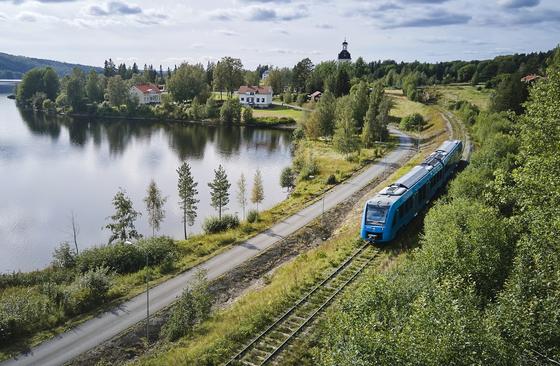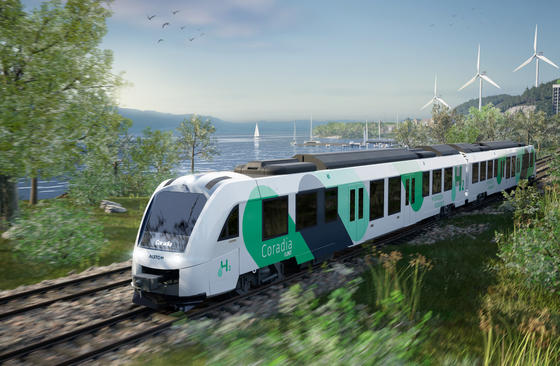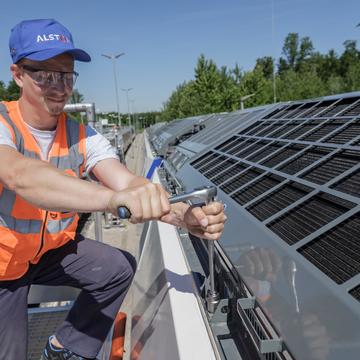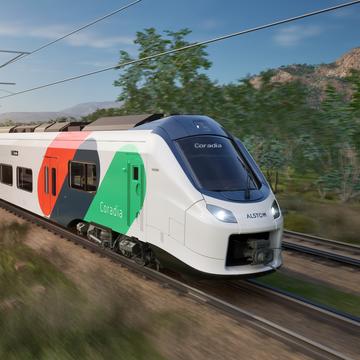
Successful tests for the first regional hybrid train on the Toulouse-Mazamet and Toulouse-Rodez lines (France)
Successful tests for the first regional hybrid train on the Toulouse-Mazamet and Toulouse-Rodez lines (France)
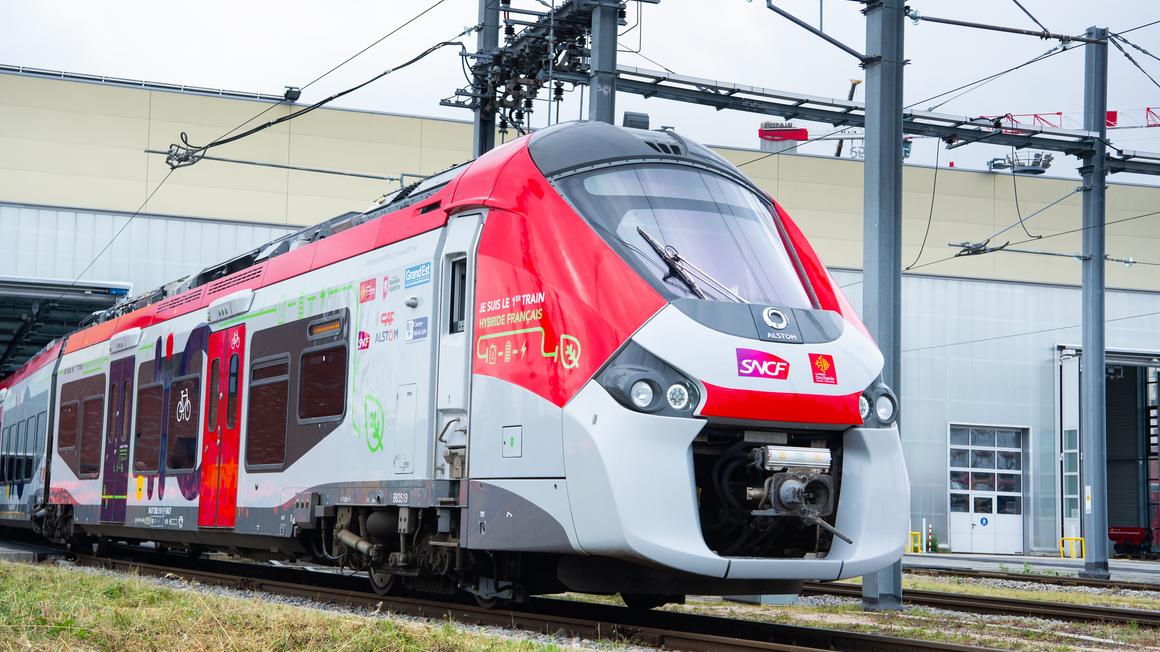
Press contact - Philippe Molitor
Philippe Molitor
Send an emailPress contact - Western France
Anne-Cécile Jourdan
Send an emailToulouse, 15 June 2023 - The first hybrid electric-diesel-battery regional train underwent its first tests at the beginning of April on the Toulouse-Mazamet and Toulouse-Rodez lines (in the South of France). The aim was to observe how the hybrid train performs on real line profiles and in real conditions (according to the timetable of a commercial service). At the end of this test phase, on 14 June, this innovative train was presented at the Occitanie Technicentre by Jean-Luc Gibelin, Vice-President of the Occitanie Region with responsibility for Mobility and Transport Infrastructure, Philippe Bru, Regional Director of SNCF Voyageurs Occitanie, and Kaïs Albouchi, Director of the Régiolis Hybrid and Hydrogen Projects at Alstom. Commercial service will begin in a few months, as soon as the Etablissement Public de Sécurité Ferroviaire (EPSF) has issued the necessary authorisations for passenger transport.
This electric-diesel-battery regional train is the first hybridisation project for a Régiolis[1] train in France. It was launched in 2018 by the SNCF Group and Alstom, with the mobilisation and financial participation of 4 French Regions (Occitanie, Grand Est, Nouvelle-Aquitaine, and Centre-Val de Loire), and the provision by the Occitanie Region of a trainset from its liO fleet. The objectives are to reduce energy consumption and cut greenhouse gas emissions, thanks to a solution that allows the existing thermal fleet to be modified without having to modify the existing infrastructure.
Along with the battery-powered train and the hydrogen train, the hybrid train is one of the three decarbonisation technologies that the SNCF Group is developing with its partners Alstom, CAF, and the French Regions for passenger transport on non-electrified (or partially electrified) regional lines.
France’s first regional train to use batteries for propulsion
Hybridization of the Régiolis trainset involved replacing half of the thermal engines with energy storage systems consisting of lithium-ion batteries. This operation was carried out at the beginning of 2021 at the CAF site in Reichshoffen[2], following an initial validation phase for the new energy storage systems at the end of 2020 at the Alstom site in Tarbes, centre of excellence for “green traction” systems.
One car of the train has also been temporarily fitted with a laboratory and multiple sensors to measure the train’s energy flows.
Equipped with its two energy storage systems and its laboratory car, the trainset has started its tests in the second half of 2021. A static and dynamic fine-tuning phase at up to 60 km/h took place at Reichshoffen to check the train’s operation and test the hybrid traction mode. Tests then continued on the Vélim test track (in the Czech Republic), with validation and certification tests at up to 160 km/h. This enabled all the train’s new traction modes to be tested at their operating speed, and the route simulation models to be validated.
First positive feedbacks
The tests showed that the train performed as expected. The braking energy recovery rate, used to recharge the batteries, is very high, at over 90%, enabling energy savings of up to 20%, depending on the route. The zero-emission battery-powered mode is designed to power the train for a few kilometres without the need to use internal combustion engines, a feature that could be useful for low-carbon journeys in built-up areas. On non-electric lines, the hybrid regional train retains the range of the initial model for up to 1,000 kilometres.
Next steps
With the final tests on the national rail network having taken place in April, SNCF Voyageurs has now to submit the admission file to the Etablissement public de sécurité ferroviaire (EPSF) with a view to obtaining the necessary authorisations for its commercial operation. SNCF Voyageurs will also use this period to prepare for the launch of the trainset in the various regions (traffic plan, staff training, etc.).
The start of the experimental commercial service is scheduled for the end of 2023 in Occitanie, particularly on the Mazamet – Toulouse and Rodez – Toulouse lines. The modified trainset will then run throughout 2024 in the Nouvelle-Aquitaine, Grand Est, and Centre-Val de Loire regions.
The industrial deployment of the hybridisation solution on other dual-mode Régiolis trainsets still needs to be specified, and could begin as soon as the Regions, the organising authorities for regional passenger transport, decide to do so.
Funding
- SNCF and Alstom each contributing 3.8 million euro
- The Occitanie, Nouvelle-Aquitaine and Grand Est regions, each contributing 3 million euro
- 250,000 euro from the Centre Val de Loire Region,
giving a total budget of 16,85 million euro.
“In the battle we are waging on behalf of the Regions to decarbonise Regional Trains, we have chosen to invest in hybrid trains, which are a useful solution for reducing CO2 emissions quickly and effectively. Alongside hydrogen and biofuels, hybrid trains are a key part of the range of technologies we are investing in as part of our PLANETER programme to move away from diesel”.
Christophe Fanichet, Chairman and CEO of SNCF Voyageurs.
“We are very proud to welcome to Occitanie the first hybrid train from the liO fleet to run on the Toulouse-Mazamet and Toulouse-Rodez lines. The skills of the SNCF and Alstom technical teams have made it possible to meet the challenge of integrating an innovative traction system into an existing rolling stock, thus paving the way for the decarbonisation of regional trains. As part of the 2023-2032 agreement, SNCF Voyageurs and the Occitanie Region have set themselves the ambitious target of reducing CO2 emissions per passenger kilometre by 40%. With the first hybrid regional train, Occitanie is the only region involved in all the trials of innovative rolling stock to reduce CO2 emissions, efficiently and quickly”.
Philippe Bru, Regional Director of SNCF Voyageurs Occitanie.
“The tests on the first Régiolis hybrid train show that hybridisation of diesel trains is a realistic solution, both technically and economically, for reducing energy consumption and greenhouse gas emissions. Alstom is particularly proud to see the hybrid train in the Occitanie region, since the traction system was designed in Tarbes, knowing that this is the greatest innovation of this train".
Benoît Carniel, Managing Director of Alstom’s Tarbes site.
“The results of these initial tests of the hybrid version of the Régiolis are the fruit of joint work between the Alstom teams and those at the CAF site in Reichshoffen. We are proud to be taking part in the development of a hybrid version of the Régiolis trains, which represents a solution to the challenge of decarbonising rail transport”.
Alain Picard, Managing Director of CAF in France.
“We’re very proud to host the latest phase of the hybrid train trials in the Occitanie region! It’s the highlight of a fantastic partnership involving 4 French Regions alongside Alstom and SNCF. Today, we are taking another decisive step towards commercial service. Making Occitanie a pioneering and exemplary region in terms of innovation and low-carbon transport naturally involves the train. As early as 2018, I committed the Region, alongside our partners, to this hybrid train experiment, which offers real perspectives in terms of energy savings and reducing greenhouse gas emissions.
Tomorrow, we’ll be going even further, as Montréjeau – Luchon will be the first line to run entirely on hydrogen-powered trains by 2025/26. And through our new agreement adopted this year, we are pursuing our objective of achieving a 40% reduction in carbon emissions on the liO regional train network by 2032.
I am convinced that the train remains our best asset in the battle to reduce the carbon footprint of our journeys. That’s what our Green Pact for Occitanie is all about”.
Carole Delga, President of the Occitanie / Pyrénées-Méditerranée Region, President of ‘Régions de France’.
“The greening of the TER train fleet is one of the major ambitions set out in Néo Terra, the Nouvelle-Aquitaine Region’s roadmap for accelerating the ecological transition, one of the objectives being to decarbonise transport and get regional trains off diesel by 2030. To achieve this, several technologies and innovations are being considered in the Region: rechargeable batteries, bioGNV, biodiesel (B100), hydrogen, and of course hybridisation, which I’m delighted to be presenting here, and I can assure you that we can’t wait to see this train running on Nouvelle-Aquitaine rail lines in 2023. A hybrid TER will very soon be on the rails, which is excellent news for our users, for the industry and for the planet”.
Alain Rousset, President of the Nouvelle-Aquitaine Region.
“To make a success of the energy transition, the Grand Est Region has a duty to develop carbon-free mass transport. Already a pioneer with Strasbourg’s Réseau Express Métropolitain Européen (REME), it is determined to go even further by greening the trains it currently operates. Successful test of the hybrid train is the first step towards achieving the objectives of this strategy. This strategy, currently being developed by the Region and SPL Grand Est Mobilités, will be based on a range of solutions based on the electrification of lines, on-board rechargeable batteries, BioGNV, hydrogen, biofuels, hybridisation, and their associated ecosystems. These actions, which the Region has already been taking for several years with the acquisition of electric or dual-mode rolling stock, are being continued with the ongoing electrification of the Paris – Troyes line, the trials of battery-powered light trains and the introduction of hydrogen trains, among the first in France, produced in Reichshoffen, which will run on green hydrogen developed by the Grand Est region and its partners, a choice that is unique in France”.
Franck Leroy, President of the Grand Est Region.
“The issue of mobility throughout the Centre-Val de Loire region is our priority. It involves saving and renovating local lines, to which we have made a major commitment with the French government, as well as the vital issue of renewing rolling stock. That’s why we’ve decided to work alongside other regions to promote the hybridisation of existing rolling stock. We will therefore be proud to welcome this prototype trainset very soon, particularly on the Bourges – Montluçon line, which is currently being renovated. The subsequent transition to the production phase of this hybridisation programme demonstrates the relevance of this multi-partner project, and offers a glimpse, in the near future, of cleaner trains that are as close as possible to the regions and their inhabitants”.
François Bonneau, President of the Centre Val de Loire Region.
[1] The Régiolis train is part of the Coradia Polyvalent range of regional trains developed and assembled by CAF at its Reichshoffen site (formerly owned by Alstom). More than 300 Régiolis trains currently operate in France. The trainset involved in the hybridisation project is a so-called 'dual-mode' trainset (electric and diesel).
[2] The Reichshoffen site (formerly owned by Alstom) became part of the CAF group in August 2022.

